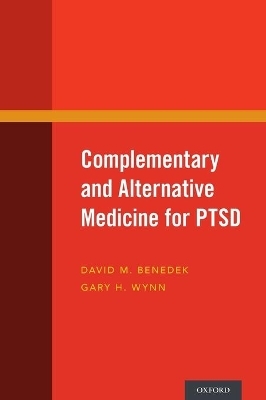
Complementary and Alternative Medicine for PTSD
Oxford University Press Inc (Verlag)
978-0-19-020595-9 (ISBN)
Complementary and Alternative Medicine for PTSD supplements these traditional treatments, using new and effective techniques to fill the therapeutic void. The alternative therapies covered include acceptance and commitment therapy, acupuncture, alternative pharmacology, canine assistive therapy, family focused interventions, internet and computer-based therapy, meditation techniques, mobile applications, recreational therapy, resilience training, transracial magnetic stimulation, virtual reality exposure therapy, and yoga. Each chapter delivers the most up-to-date understanding of neurobiology, best practices, and key points for clinicians and patients considering inclusion of these treatments in patient care.
COL David Benedek and LTC Gary Wynn offer insight into the future of complementary and alternative medicine, shining a light onto how these techniques fit into clinical practice to create the most beneficial treatments for the patient. This book is both an essential resource and practical guide to everyday clinical interactions. It is a necessary addition to the medical library for students and senior clinicians alike.
COL David Benedek, MD has served as Professor and Deputy Chair of the Department of Psychiatry and a Senior Scientist at the Center for the Study of Traumatic Stress at the Uniformed Services University of the Health Sciences. He has recently assumed duties Chief of Forensics and Director of the Center for Forensic Behavioral Sciences at the Walter Reed National Military Medical Center. His clinical and research interests have ranged from disaster preparedness and response and management of Posttraumatic Stress Disorder to understanding and predicting violent behavior. LTC Gary Wynn, MD is an Associate Professor of Psychiatry and Neuroscience in the Department of Psychiatry and Scientist at the Center for the Study of Traumatic Stress at the Uniformed Services University of the Health Sciences. Dr. Wynn's career has focused on Posttraumatic Stress Disorder and improving treatments for our men and women returning home from combat. His efforts have included investigations of non-traditional methods to palliate the suffering experienced upon return from deployment.
Table of Contents
Part 1: Introduction
Chapter 1 Introduction
Gary H. Wynn, MD and David M. Benedek, MD
Chapter 2 Posttraumatic Stress Disorder: An Overview
David M. Benedek, MD and Gary H. Wynn, MD
Part 2: Alternative Treatments
Chapter 3 Acceptance and Commitment Therapy (ACT) for Posttraumatic Stress Disorder
Janina Scarlet, MD, Ariel J. Lang, MD, and Robyn D. Walser, MD
Chapter 4 Meditation Techniques for Posttraumatic Stress Disorder
Marina Khusid, MD, ND, MSA
Chapter 5 Transcranial Magnetic Stimulation Treatment of Posttraumatic Stress Disorder
Caroline Clark, MD, Jeffrey Cole, PhD, Christine Winter, DO, and Geoffrey Grammer, MD
Chapter 6 Acupuncture
Daniel J. Balog, MD, USAF, MC, FS, Joseph M. Helms, MD, FAAMA, and Robert L. Koffman, MD, MPH
Chapter 7 Alternative Medicine Pharmacology
Robert N. McLay, MD, PhD, Derek M. Miletich, MD, Nathaniel Brown, MD, and Lesley Ross, MD
Part 3: Complementary Treatments
Chapter 8 Canines as Assistive Therapy for Treatment of PTSD in the United States Military
Elspeth Cameron Ritchie, MD, MPH, Perry Chumley, DVM, MPH, Meg Daley Olmert, MD, Rick A. Yount, MS, Matthew St. Laurent, MD, and Christina Rumayo, MDr
Chapter 9 Family Focused Interventions for PTSD: Lessons from Military Families
Stephen J. Cozza, MD
Chapter 10 Recreational Therapy for PTSD
Holly J. Ramsawh, PhD and Gary Wynn, MD
Chapter 11 The Use of Yoga-Based Interventions for the Treatment of Posttraumatic Stress Disorder
Brian Pilecki, MD, Megan Olden, MD, Melissa Peskin, MD, Lucy Finkelstein-Fox, MD, and JoAnn Difede, PhD
Chapter 12 Resilience Training as a Complementary Treatment for PTSD
Robin L. Toblin, PhD and Amy B. Adler, PhD
Part 4: Alternative Delivery Methods
Chapter 13 Virtual Reality Exposure Therapy for PTSD
Michael J. Roy, MD, MPH, Albert Rizzo, PhD, JoAnn Difede, PhD, and Barbara O. Rothbaum, PhD, ABPP
Chapter 14 Internet and Computer-Based Treatments for the Management of PTSD
Bradley E. Belsher, PhD, Daniel P. Evatt, PhD, Michael C. Freed, PhD, and Charles C. Engel, MD, MPH
Chapter 15 Mobile Apps to Improve Outreach, Engagement, Self-Management, and Treatment for Posttraumatic Stress Disorder
Julia E. Hoffman, PsyD, Eric Kuhn, PhD, Jason E. Owen, PhD, and Josef I. Ruzek, PhD
Part 5: Conclusion
Chapter 16 Toward a More Comprehensive Approach to the Management of PTSD
David M. Benedek, MD and Gary H. Wynn, MD
Index
| Erscheinungsdatum | 25.05.2016 |
|---|---|
| Verlagsort | New York |
| Sprache | englisch |
| Maße | 257 x 180 mm |
| Gewicht | 839 g |
| Themenwelt | Geisteswissenschaften ► Psychologie ► Biopsychologie / Neurowissenschaften |
| Geisteswissenschaften ► Psychologie ► Klinische Psychologie | |
| Medizin / Pharmazie ► Medizinische Fachgebiete ► Notfallmedizin | |
| Medizin / Pharmazie ► Medizinische Fachgebiete ► Psychiatrie / Psychotherapie | |
| Medizin / Pharmazie ► Naturheilkunde | |
| ISBN-10 | 0-19-020595-4 / 0190205954 |
| ISBN-13 | 978-0-19-020595-9 / 9780190205959 |
| Zustand | Neuware |
| Haben Sie eine Frage zum Produkt? |
aus dem Bereich


